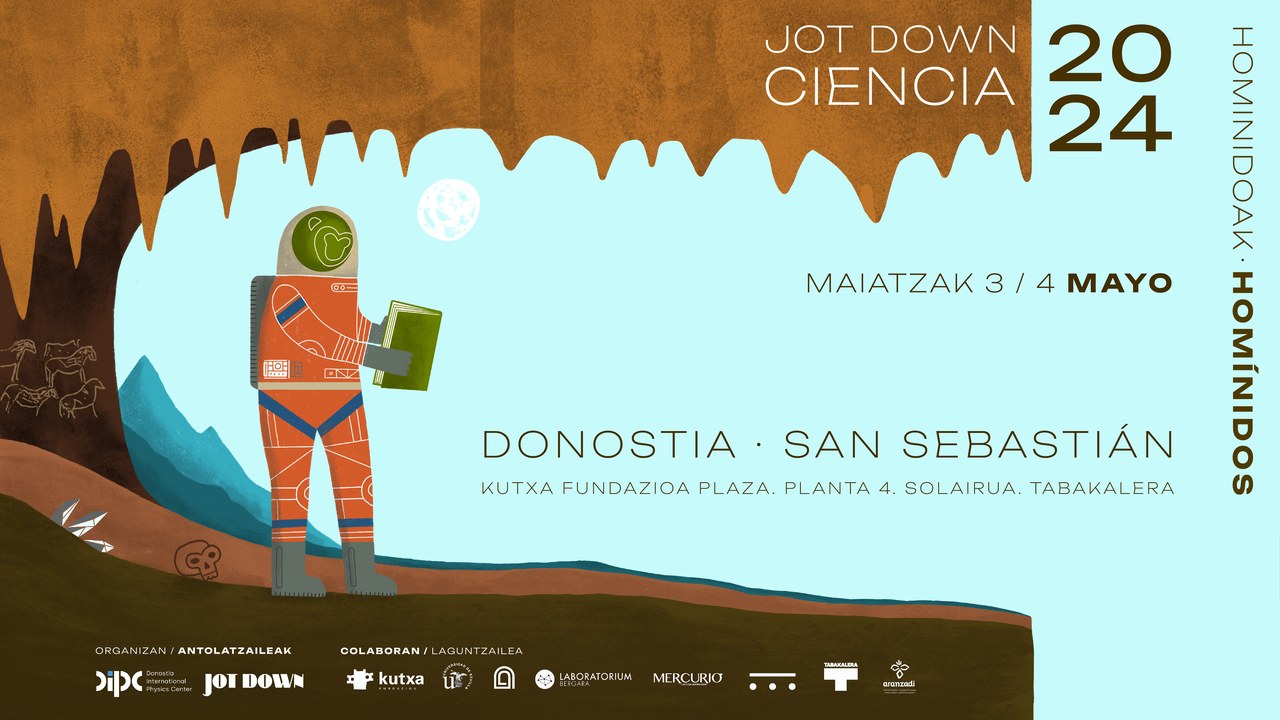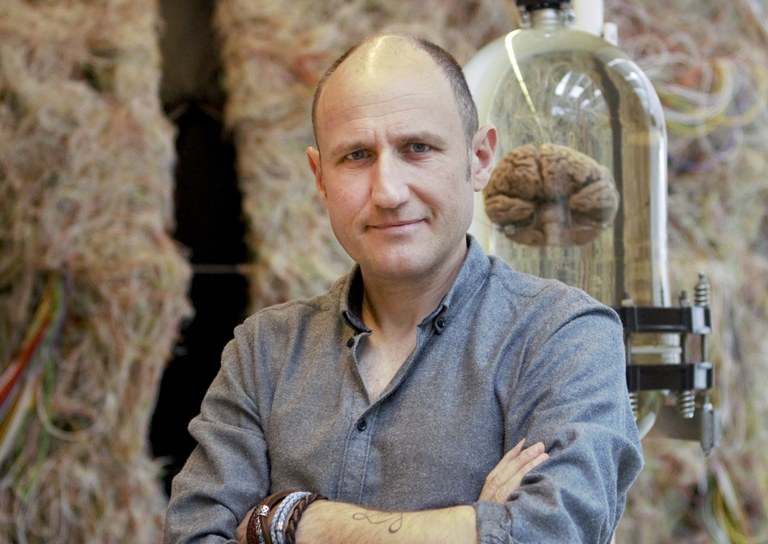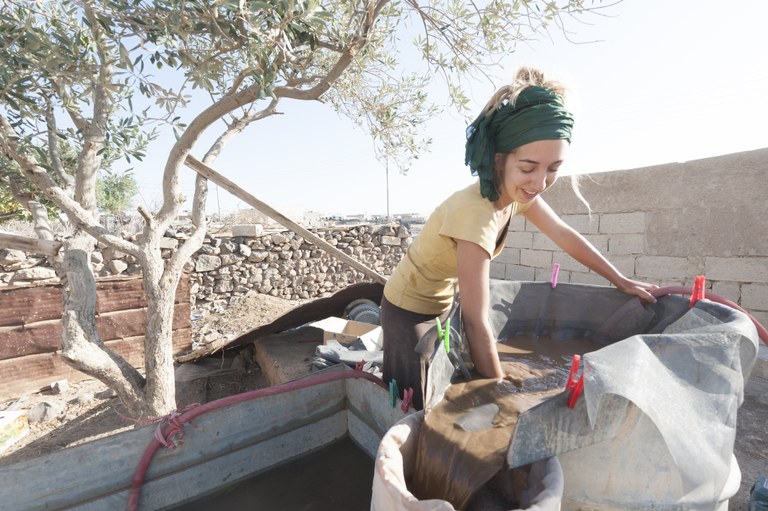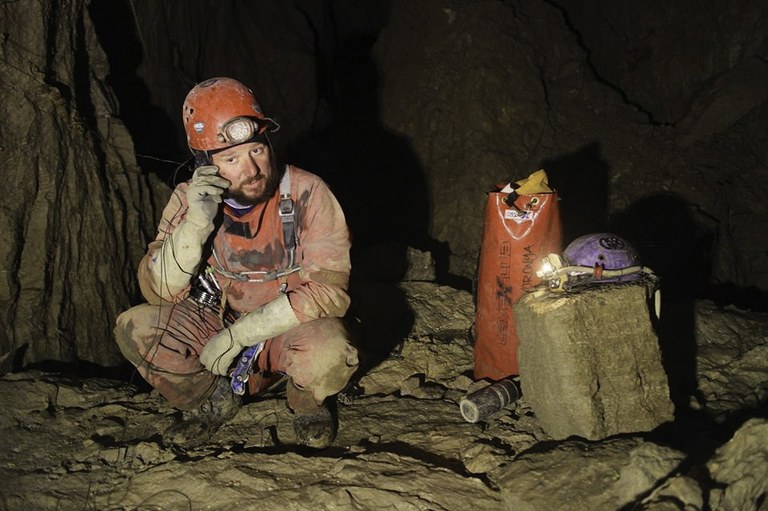Jot Down Ciencia 2024 - Conference Friday
Ciencia Jot Down
- When
-
2024/05/03
18:00 - Place
- Tabakalera, Kutxa Fundazioa Plaza, 4th floor, Donostia / San Sebastián
- Organizers
- DIPC, Jot Down
- Add to calendar
-
iCal

Jot Down Ciencia 2024 - Hominids
Open Lectures. Free entrance until full capacity is reached.
Language of the lectures: Spanish.
Presenters: Valentina Rodriguez (DIPC) and Itxaso Azcune (DIPC)
18:00h Opening
18:15h Humans, Hominids, and other lost apes - Emiliano Bruner (Centro Nacional de Investigación sobre la Evolución Humana, Burgos (CENIEH), Centro de Investigación en Enfermedades Neurológicas, Madrid (CIEN))

Taxonomy catalogues biological diversity, and the term 'Hominid' is a key category for understanding the evolution of the human genus. In paleontology, it can be challenging to apply certain rigid schemes to fossils due to the scarcity of available information. Furthermore, everything related to humans is inevitably coloured by values, which can significantly bias the perception of 'others' as independent elements of a natural history that is only partially shared.
18:45h Why did agriculture begin? - Amaia Arranz (Ikerbasque, UPV/EHU, Aranzadi Zientzia Elkartea)

The transition to agriculture represents one of the most important changes in human history, but when, how and why did this process begin? In this talk we will travel to Southwest Asia to answer these fundamental questions of prehistory. We will learn about the way of life of the last gathering and hunting communities, we will talk about food and the role that bread played, and we will reflect on what we know (and don't know) about this process that undoubtedly transformed our way of life forever.
19:15h Art and Science roundtable with Clara Montero (Tabakalera), Mauricio Antón (paleontological illustrator) and Marina Otero (Columbia University). Moderator: Amaia Arregi (DIPC).

Art and science are undoubtedly two activities developed by human ingenuity and creativity throughout its evolution. This roundtable will explore the symbiosis between art and science through the perspectives of art historian and cultural manager Clara Montero, paleontological illustrator Mauricio Antón, and architect and researcher Marina Otero. The dialogue will be moderated by Amaia Arregi (DIPC).
20:00h Speleology. The final frontier of human exploration on Earth - Sergio García Dils (Cave Exploration Team CAVEX, Rusia-España international coordinator).

In our days, we have increasingly accessible technological resources to study any terrestrial nook, no matter how remote it may be, making direct human involvement in geographical exploration less necessary. However, there is still no technology that provides us with complete and detailed knowledge of the Earth's depths, of natural caves and chasms, which makes them the final frontier of exploration with exclusive human importance.
20:30h Jot Down Ciencia 2024 contest award ceremony
- Best popular science essay.
- Best science fiction narrative text.
- Best scientific illustration.
- Best scientific photography.
About the speaker
Emiliano Bruner holds a PhD in Animal Biology from La Sapienza University of Rome (Italy). He heads the Hominid Paleoneurobiology group at the National Research Center on Human Evolution (CENIEH) in Burgos and is an affiliated researcher at the Center for Research on Neurological Diseases (CIEN) in Madrid. His research interests include comparative neuroanatomy, paleoneurology, and cognitive archaeology, particularly focusing on the evolution of the parietal cortex, visuospatial integration, and attentional systems.
Amaia Arranz has a degree in History and a PhD in Prehistory from the University of the Basque Country-Euskal Herriko Unibertsitatea. She is a specialist in Archaeobotany and has developed most of her research in Southwest Asia (Syria, Lebanon, Jordan and Iran). Her lines of research include, among other aspects, the study of plant diet during the Paleolithic and Neolithic periods, the use of wild plants, and their subsequent domestication process. He is currently investigating the remains of food consumed by the last hunter-gatherers and the first peasant communities in Southwest Asia, and collaborates with several national and international centres.
Clara Montero is an art historian and cultural manager. Born in San Sebastián, she studied Art History, Psychology, and Pedagogy at the University of Frankfurt. After working at the Institute of Art History in Frankfurt and art galleries in Zurich, she returned to San Sebastián in 2008 to join the Tabakalera project as coordinator of activities. In 2012, she was appointed director of cultural promotion by the Basque Government, where she contributed to developing public policies in the cultural industries sector. She is currently the cultural director of Tabakalera, the International Center for Contemporary Culture in San Sebastián.
Mauricio Antón has been a paleontological illustrator since 1988, and his work is exhibited in museums worldwide. He has authored the books "The Secret of Fossils" and "Sabertooth" and is a co-author and illustrator of many others. His research work has led him to publish numerous scientific articles in collaboration with the Department of Paleobiology at the National Museum of Natural Sciences. He has published popular science articles and collaborated with BBC and National Geographic on documentary productions. In 2020, he was awarded the Basler Chair of Excellence at East Tennessee State University, USA.
Marina Otero Verzier is an architect and researcher. Otero is part of the Advisory Committee for Architecture and Design at the Museo Nacional Centro de Arte Reina Sofía. She has been the director of Programming at Studio-X, Columbia University GSAPP, director of the Master in Social Design at Design Academy Eindhoven and director of Research at the Nieuwe Instituut in Rotterdam. She has curated exhibitions at the Porto Municipal Gallery (2023), the Venice Architecture Biennale (2018), the Oslo Architecture Triennale (2016) and the Shanghai Biennale (2022), among others. In 2022, she received the Harvard Wheelwright Prize.
Sergio García Dils, after starting in speleology in 1978, became a founding member of the CAVEX Team in Moscow in 1993, and since then has developed his explorations mainly in the Caucasus Mountains (Abkhazia and Russia), the Julian Alps (Slovenia), and the Taurus Mountains (Turkey). For achieving the world depth record on several occasions in the Krubera-Voronya cave (-2200 m), he has received various distinctions, such as the International Speleological Union Award (Brasilia, 2001), the Alexander Morozov Medal (Moscow, 2002), the Royal Order of Sports Merit (Madrid, 2008), or the Spanish Geographic Society Award (Madrid, 2016).
